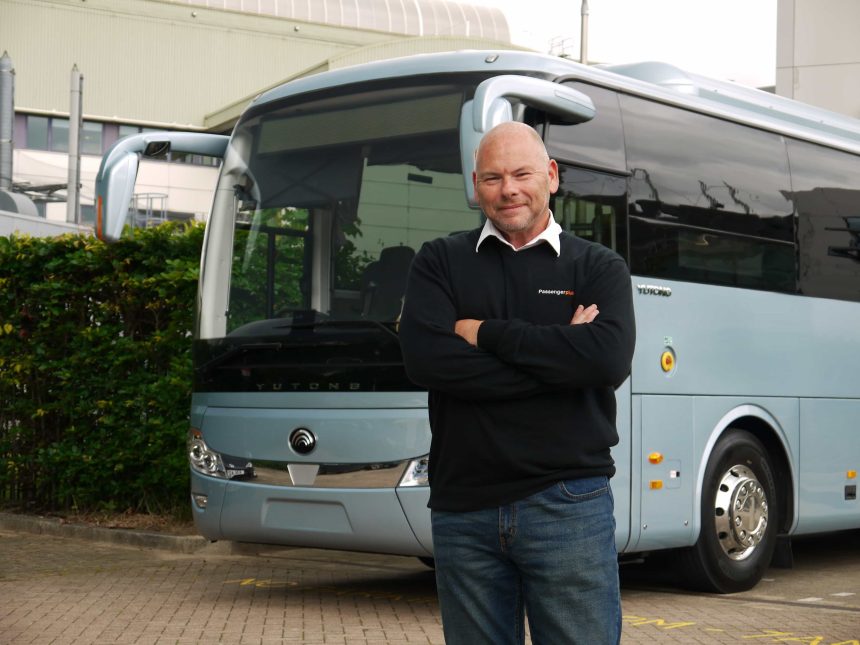Last month increases in employers’ National Insurance (NI) contributions introduced on 6 April drew a mixed response from coach and bus operators.
While bus operators reported an impact on fare increases, for coach, ease in absorbing the uplift is proving to depend on type of work undertaken.
Corporate contracts inflexible
Passenger Plus, which undertakes primarily corporate last mile contract work and private hire, says private hire rates have risen to account for the uplift, but the increase in contributions has been hard on fixed-price corporate contracts.
Managing Director Mark Drury (pictured, above) reports that the uplift will sit on the operator’s books as an additional £70,000 per year.
While there is a mechanism within its corporate contracts (which are typically fixed for five years) for ‘cost-of-living increases’ the NI increase is being viewed as an ‘operational cost’ that all businesses have to absorb. That has meant inflexible rates on such work, which accounts for some 75% of its income.
“But we would not like to keep approaching the client to ask for more money, anyway,” Mr Drury notes. “We pride ourselves on maintaining that the price of a contract is agreed for five years unless something goes wrong. We’re good at knowing our costs.”
One consequence will mean no increase in driver pay rates this year, but Mr Drury notes this is mitigated by the fact Passenger Plus already pays its drivers very competitive salaries. “Drivers have been understanding. Having said that, we pay well, and there is no shortage of drivers this year. Two rounds of recruitment have us oversubscribed and fully staffed.”

Part of broader costs
Operators in the tourism market may be more equipped to absorb NI increases through increased efficiencies or rates, as suggested in a LinkedIn post by Selwyns last month. But for some, they simply form an entire package of increases that the sector is currently contending with.
Parrys International Tours has seen NI contributions for its workforce of 35 increase from £5,374 in May 2024 to £11,227 this year. When isolated, that is a significant increase. But owner Dave Parry says it forms part of an overall picture of cost increases. Advance planning means there has been no need to change staffing levels, hours or pay as a result.
“Individually, it’s not NI that’s the big issue for operators,” he explains. “The operators have more to worry about in terms of increases from hotels and suppliers. Everything has been at a steady increase, and as we increase prices each year to reflect our costs going up, NI has not made a significant difference.”
Mr Parry reveals hotel rates have doubled in the last five years, with the company now footing €150 or more per night in some locations. But all annual increases are accounted for in planning.
“We have to be accountants, we’re not simply coach operators anymore. Having said that, we were on track for one of our best years. 2024 was one of our best, but a downturn since April has put us in not as good a position as hoped. That is due to a drop in demand rather than our own costings. The forecast for next year is far better.”
NI might still account for that downturn; while the increases might be less of a concern for some operators, Mr Parry says they are very much visible for those booking trips. “With the announcement of the NI change and minimum wage uplift in April, and everyone expecting a cost-of-living increase, people reacted,” he says. “People took that on board and stopped spending to a certain extent.”
Necessary increases
Group Managing Director Roger Mott of Motts Leisure and Crusader Holidays is expecting a rates jump to combat NI increases in April and a 3-5% staff pay increase. Figures are not finalised yet, but the NI uplift is anticipated to cost the business somewhere in the region of £80,000 for its workforce of 80 drivers and office staff.
 To combat it, this year Motts is pricing private hires 8% higher than in 2024. But, like Parrys, Motts reports that NI increases are compounded by increases in hotels and hospitality costs.
To combat it, this year Motts is pricing private hires 8% higher than in 2024. But, like Parrys, Motts reports that NI increases are compounded by increases in hotels and hospitality costs.
“Generally speaking, we are getting acceptance on the 8% increase,” Mr Mott says. “If we took a group last year for £300, and we go up to around £325, we are getting those prices. That is not successful 100% of the time, and I know of operators increasing rates by around 5%. But that is too risky for us, given the competition in our area.”
While it has flexibility on private hires, home-to-school transport contracts have not seen increases in rates since 2021, presenting another source of frustration. As for other tourism work, Mr Mott reports difficulty in the recovery of continental travel, while the UK coach holiday scene is “dribbling” along.
“June has been slow for numbers, and the average for departures is down,” he adds. “The continent remains a struggle, one of the biggest issues there being the rigmarole of going abroad. We’re fighting a losing battle when it comes to costs. The latest NI increases are just another employment tax, and we must all cope with it how we can.”


























